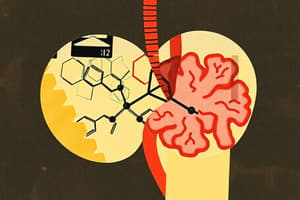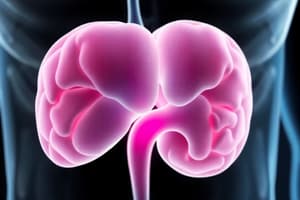Podcast
Questions and Answers
Which condition is characterized by an increase in aldosterone secretion?
Which condition is characterized by an increase in aldosterone secretion?
- Metabolic alkalosis (correct)
- Metabolic acidosis
- Hyperkalemia
- Hypokalemia (correct)
What is the primary effect of aldosterone in the kidney?
What is the primary effect of aldosterone in the kidney?
- Decrease Na+ absorption
- Increase H+ excretion exclusively
- Increase Na+ absorption in exchange for H+ or K+ (correct)
- Increase K+ absorption
How does cortisol affect protein metabolism?
How does cortisol affect protein metabolism?
- It enhances protein synthesis
- It has no effect on protein metabolism
- It decreases protein synthesis and increases protein catabolism (correct)
- It decreases protein catabolism
What triggers the release of ACTH, which stimulates the adrenal glands?
What triggers the release of ACTH, which stimulates the adrenal glands?
Which glucocorticoid hormone is primarily produced by the zona fasciculata?
Which glucocorticoid hormone is primarily produced by the zona fasciculata?
What is the clinical picture of hypoaldosteronism?
What is the clinical picture of hypoaldosteronism?
Which effect is associated with glucocorticoids on the blood cells?
Which effect is associated with glucocorticoids on the blood cells?
What is one of the psychological effects of glucocorticoids?
What is one of the psychological effects of glucocorticoids?
What is the primary effect of hypercortisolism on the body?
What is the primary effect of hypercortisolism on the body?
What is one of the main actions of catecholamine secreted by the adrenal medulla?
What is one of the main actions of catecholamine secreted by the adrenal medulla?
Which condition is associated with hypocortisolism?
Which condition is associated with hypocortisolism?
What effect does antidiuretic hormone (ADH) have during hypovolemic shock?
What effect does antidiuretic hormone (ADH) have during hypovolemic shock?
What initiates the release of oxytocin during childbirth?
What initiates the release of oxytocin during childbirth?
In the absence of antidiuretic hormone (ADH), what happens to urine output?
In the absence of antidiuretic hormone (ADH), what happens to urine output?
What enhances the contractile response of uterine muscles to oxytocin during labor?
What enhances the contractile response of uterine muscles to oxytocin during labor?
Which gland is referred to as the master gland of the endocrine system?
Which gland is referred to as the master gland of the endocrine system?
Flashcards are hidden until you start studying
Study Notes
Adrenal Gland
- Located near the kidneys
- Growth and hormone synthesis are stimulated by Pituitary ACTH
- ACTH release is triggered by stress (e.g. hypoglycemia, low body temperature, shock)
- Adrenal cortex is controlled by Pituitary gland ACTH
- Adrenal medulla is part of the sympathetic nervous system
Adrenal Gland Hormones
- Mineralocorticoid Hormones (zona glomerulosa):
- Aldosterone (95%) and Desoxycorticosteron (5%)
- Aldosterone is the primary mineralocorticoid secreted by the adrenal cortex
- Acts mainly in the kidneys (distal convoluted tubule) to increase sodium absorption in exchange for hydrogen or potassium
- Released in response to:
- Low sodium levels (Hyponatremia)
- High potassium levels (Hyperkalemia)
- Angiotensin II
- Hyperaldosteronism: Increased aldosterone secretion
- Clinical picture:
- Low potassium levels (Hypokalemia)
- Metabolic alkalosis
- Clinical picture:
- Hypoaldosteronism: Decreased aldosterone secretion
- Clinical picture:
- High potassium levels (Hyperkalemia)
- Metabolic acidosis
- Clinical picture:
- Glucocorticoid Hormones (zona faciculata):
- Cortisol (95%) and corticosterone (5%)
- Essential for life
- Influences various organs:
- Metabolic Effects:
- Carbohydrate Metabolism:
- Anti-insulin effect
- Increases blood sugar levels by:
- Increasing gluconeogenesis from amino acids
- Decreasing glucose utilization by peripheral tissues
- Decreases protein synthesis and increases protein catabolism
- Enhances lipolysis and causes fat redistribution
- Carbohydrate Metabolism:
- Circulatory Functions: Maintains normal circulatory functions and cardiovascular responsiveness to catecholamines
- Hematological Effects:
- Decreases all blood cells except red blood cells and platelets
- Anti-inflammatory effect by decreasing eosinophils, basophils, and stabilizing their lysosomal membranes
- Gastric Effects: Increases gastric hydrochloric acid (HCl) and decreases mucosal cell proliferation, leading to gastritis and peptic ulceration
- Psychological Effects: Euphoria, psychosis, depression, paranoia
- Lung Function: Increases lung surfactant in late pregnancy
- Aldosterone-like Effect: Exerts aldosterone-like effects
- Plasma Cortisol Levels: Follow a diurnal pattern or circadian rhythm (highest just before waking, lowest at midnight)
- Metabolic Effects:
- Hypercortisolism: Causes Cushing syndrome
- Clinical picture:
- Moon face
- Buffalo hump
- Pendulous abdomen
- Muscle wasting
- Osteoporosis
- Poor wound healing
- Clinical picture:
- Hypocortisolism: Causes Addison's disease
Adrenal Medulla
- Secretes catecholamines (e.g. epinephrine, norepinephrine) in response to sympathetic nervous system stimulation during stress
- Actions of catecholamines:
- Vasoconstriction and increased blood pressure
- Increased heart rate and cardiac output
- Bronchodilation
- Glycogenolysis
- Increased basal metabolic rate (calorigenic effect)
- Tumors of the adrenal medulla lead to over-secretion of catecholamines, causing episodes of hypertension
Antidiuretic Hormone (ADH)
- Functions:
- Regulation of Body Water Balance: In the absence of ADH, the distal nephron becomes impermeable to water, resulting in the excretion of large volumes of diluted urine (20 ml/minute).
- Vascular Smooth Muscle Contraction: High concentrations of ADH stimulate vascular smooth muscle contraction (pressor effect), which is a crucial compensatory reaction in hypovolemic shock.
Oxytocin
- Synthesized by the hypothalamus as part of a prohormone
- Transported to the posterior pituitary for storage
- Release Triggered By:
- Stretch receptors in the cervix during labor
- Touch receptors in the nipple during suckling (milk let down reflex)
- Functions:
- Initiation of Labor: Contractile response of uterine muscles to oxytocin is enhanced by estrogen and antagonized by progesterone levels. In late pregnancy, uterine smooth muscles become more sensitive to circulating oxytocin.
- Milk Ejection: Suckling stimulates touch receptors on the nipple, sending nerve signals to the hypothalamus, leading to oxytocin secretion and contraction of myoepithelial cells around the alveoli of the mammary gland.
Reminder
- Endocrine glands are ductless glands that secrete regulatory molecules called hormones.
- The pituitary gland is the master gland of the endocrine system.
Studying That Suits You
Use AI to generate personalized quizzes and flashcards to suit your learning preferences.




